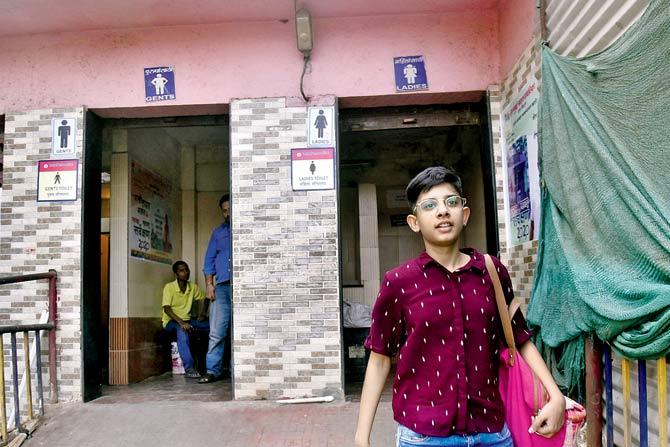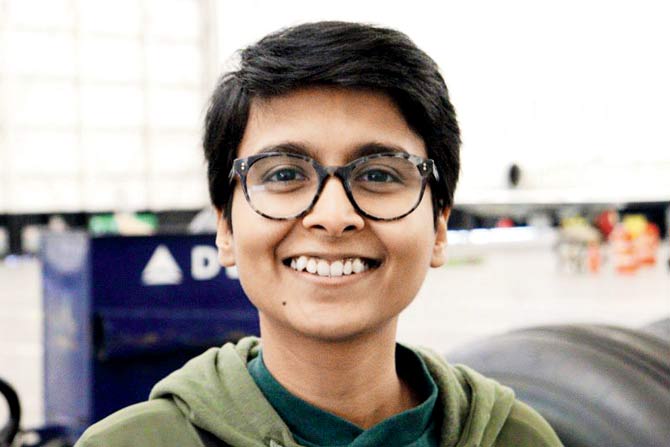In a country where women who don-t look woman-enough aren-t allowed in the ladies loo, a bunch of people who identify as non-binary are coming out and saying, don-t call me he or she, call me "they"

Swapnil Alizeh, 21, a former call centre employee, is searching for a job at an organisation thats gender forward. Praful Baweja, who conducts a job fair for talent from marginalised groups, says gender-fluid or non-binary persons are hesitant to be frank
Last September, Grammy Award-winning singer-songwriter Sam Smith came out as non-binary and asked to be addressed by the pronouns they/them. The 27-year-old wrote on Instagram: "After a lifetime of being at war with my gender, I-ve decided to embrace myself for who I am, inside and out." Smith went on to add that on hearing people speak about non-binary identity, which is used to describe those who identify as neither exclusively male nor female, they thought, "f, that-s me."
ADVERTISEMENT
Sitting thousands of miles away in Panvel, Ria Sharma knew exactly what Smith was experiencing. In 2017, Sharma came out as gender-fluid. As a child, Sharma felt "a little bit boy, and, sometimes, girl". Their parents had sensed the conflict early on, and were accepting of their child-s uniqueness. "It-s not that I was a fan of Smith, but when they made the announcement, I thought it was brave and inspiring," says the 20-year-old. Sharma-s list of queer idols also includes Alok Vaid Menon, a New York-based performance artiste, and Mumbai artist-sculptor Durga Gawde. Both prefer to be referred to by the pronoun, they.
 Swapnil Alizeh recently requested a meeting with a future employer at an ad agency to discuss how gender sensitive his organisation is. A bitter experience at their earlier workplace necessitated it, they say
Swapnil Alizeh recently requested a meeting with a future employer at an ad agency to discuss how gender sensitive his organisation is. A bitter experience at their earlier workplace necessitated it, they say
The pronoun-s takeover of the singular sense, and as alternative to s/he, seems to be gaining legitimacy. In December 2019, Merriam-Webster dictionary announced -they- as the word of the year. Subsequently, the American Dialect Society, a 131-year-old group comprising linguists, lexicographers, grammarians, historians and researchers, declared they as the word of the decade. The pronoun, in fact, beat other contenders in the decade category, including BlackLivesMatter, MeToo, climate, emoji, meme, opioid crisis and woke. "The selection is a reflection of how the personal expression of gender identity has become an increasing part of our shared discourse," the chair of the American Dialect Society-s New Words Committee, Ben Zimmer, said in a statement. The initial stamp of approval, though, came three years ago when the Oxford English Dictionary added the terms to its fold, defining it as "a person who does not identify with a single fixed gender; of or relating to a person having or expressing a fluid or unfixed gender identity."
Think of it as a grandfather clock pendulum, says Rohan Mathews, who works as project manager for sexual minorities organisation Sangama in Bengaluru. "If you were to place masculine on one end of the spectrum and feminine on the other, my gender would be like the pendulum, constantly oscillating." Like Sharma, Mathews is vocal about their pronoun preference. On most days, sometimes, even by the minute, Mathews- feelings fluctuate between male and female. The clothes match the mood. It-s sarees on days they are feeling feminine; on other days, it ranges from shirts to kurtas. "The minute I wear a saree and walk around, the question I get is, why don-t you shave? Or why don-t you try wearing a padded bra, because it will make your chest look a lot more attractive. Looking at me, some queer folk assume that I will opt for a medical transition eventually, but I don-t feel the need for one." Mathews, 23, is happy to not conform to any particular gender. The difference between gender identity and gender expression, they say, is often lost in conversation. "To put it simply, gender identity is about how you feel. Gender expression is about how you choose to present [yourself]."

Rohan Mathews, a resident of Bengaluru, says their feelings oscillate by the minute, and the clothes often match the mood. But the minute they sport a saree, they are asked, -why don-t you shave?- Pic/ Ajeesh Rawther
Fluidity is essentially about expanding boundaries, says Sharma, who gravitates towards androgynous clothing. But, it-s one thing to convince people that you are queer, and another to get them to address you with the pronoun of your choice. It-s not uncommon for Sharma to land into disagreements over the topic with peers. "A couple of friends refused to address me as they. They said, we-ll call you what we-re comfortable with. While, these labels aren-t stringent, like sealed boxes, they give me a sense of identity. Sometimes, it-s important." It took a bit of getting used to, but Sharma-s parents now use they when addressing their child.
Mathews agrees that it-s not easy to tear down stereotypes, because we are conditioned to binaries. "I don-t get offended if somebody uses a pronoun of their choice [to address me], as long they aren-t deliberately doing it to rub me the wrong way."
Not everybody may be fluent in the language of gender, and pronoun introductions come with their set of difficulties. Apu Dutta, software engineer at Microsoft, Seattle, knows it all too well. Dutta identifies as agender someone without a gender, and is married to a cis-male who identifies as a man and was assigned the male sex at birth. Last year, Dutta came out and adopted they as their chosen pronoun. "People find it difficult to wrap their heads around the fact that my gender identity is independent of my sexual orientation. Fortunately, my husband understands this, and does a good job using the right pronouns and gender neutral words like spouse when referring to me [as opposed to wife]." It-s taken a while for Dutta to make peace with their queerness. "I used to feel alienated because I didn-t know anybody else who felt the same way. As I educated myself by reading more, I understood that it wasn-t necessary for everyone to fit neatly into a binary," says the 26-year-old.

Praful Baweja, co-founder 6 Degrees, an LGBTQIA+ job-seeking platform, says most gender fluid persons are hesitant to ask employers if a gender-sensitisation policy is in place, because of the fear of discrimination
Despite its seeming trendiness, the use of the singular they is old hat, insists linguist Raamesh Gowri Raghavan. According to him, they has been used in the English language for over 500 years as a pronoun for a person whose gender is not known. "For instance, you-d say, -Someone has come to see you. They are waiting for you-. -They-, in this context, is used as singular, without discriminating the gender." French, too, has a similar pronoun: un to refer to -someone- in cases where the gender is not clear. "The other gender-neutral word in the English language is one. The old saying goes, when one goes to Rome, one does as the Romans," he says.
But, it-s the last decade that has seen the resurgence of the pronoun. Professor Dr Ketki Ranade, member of the Gender Amity Committee at The Tata Institute of Social Sciences, says the idea of discussing non-binary genders has emerged from conversations around gays, lesbians, trans people and the sub-categories that exist within these identities. "At some point, this question of what is the gender location of the queer became a talking point. In lesbian history, we have sub-categories like the butch and femme woman. Butch is used in LBT culture to describe someone who expresses themselves in a typically masculine way, while femme is someone who expresses themselves in a typically feminine way. It-s at this point that the narrative about looking at genders outside the binary of man and woman, and representing these identities, kick started."
 Student and TEDx speaker Ria Sharma was asked to cough up an extra R20 at a public toilet at CSMT because the caretakers didn-t think they looked woman enough. Pic/ Pradeep Dhivar
Student and TEDx speaker Ria Sharma was asked to cough up an extra R20 at a public toilet at CSMT because the caretakers didn-t think they looked woman enough. Pic/ Pradeep Dhivar
While discussions about gender identities has gained momentum, it-s yet to manifest at the workplace and in public spaces. Praful Baweja, co-founder of 6 Degrees, an LGBTQ networking and job-seeking platform, often comes across gender fluid job seekers at Vividh, a job fair that he launched last year to promote diverse talents from marginalised groups. "What I-ve seen is that most gender fluid people are hesitant to even ask an employer if the organisation has a policy in place, because of the fear of discrimination. They don-t want to address it until they have gauged the atmosphere at the workplace," he says. The glitch, according to Baweja, is that gender-fluid persons are unwittingly seen as "confused". "Being addressed as -they- is not something most people understand. For now, it-s a very urban and elite phenomenon."
 Raamesh Gowri Raghavan, linguist
Raamesh Gowri Raghavan, linguist
Last week, Swapnil Alizeh, whose Instagram handle is @girlwith_a_beard, met a future employer at an ad agency to discuss how gender sensitive the organisation he heads is. An earlier stint at a call centre necessitated it. "Forget addressing me as they, I was made to feel like an alien. I would be stared at and taunted because I don-t look strictly binary," says the 21-year-old. It-s not just workplaces that are potentially problematic for gender fluid individuals, but also public toilets. "The atmosphere is more hostile there," says Sharma. What may seem like invisible acts of categorisation stand out for non-binary persons. For instance, they often encounter the question, which gendered line at a mall security check to join. "The other day, the staffers at a public bathroom at CSMT charged me an extra Rs 20 because I didn-t fit their idea of a woman." But Sharma has learnt to navigate the speed bumps without losing their cool. Quoting comic Abhish Mathew, they say, "You don-t have to get it, you just have to respect it."

Apu Dutta, a software engineer at Microsoft, Seattle, identifies as agender, and is spouse to a cis-male, someone who identifies as male and was assigned the male sex at birth
Gender minder
Sex
People can be classified into male, female, or intersex based on biological characteristics such as chromosomes, hormones, external and internal genetalia gonads.
Sexuality
The way people experience and express themselves sexually.
Sexual Orientation
A person-s sexual identity in relation to the sex and the gender of the person they are attracted to.
Some of these are:
Homosexual: Sexually attracted to people of the same sex.
Heterosexual: Sexually attracted to people of another sex.
Bisexual: Sexually attracted to both men and women.
Pansexual: People whose sexual attraction is not determined by their partner-s sexual or gender identity.
Asexual: People who feel a lack of sexual attraction to others.
Gender
Social and cultural differences among the sexes. It manifests itself in the ways people are socialized to talk, dress, eat, behave, etc.
Gender identity
One-s personal sense of one-s own gender.
Cis
A person whose personal identity corresponds with the sex assigned at birth, and the gender identity associated with it.
Trans
A person whose personal identity is incongruent with the sex assigned to them at birth, and the gender identity associated with it.
Binary
MTF male to female
FTM female to male
People who want to transition socially and/or medically using hormones, surgery etc. from one sex to another.
Non-binary
Also known as genderqueer
People who don-t identify as exclusively male or female. This group includes a spectrum of identities such as:
Agender: Without gender or genderless.
Gender Fluid: A person whose gender fluctuates between more than one gender.
Catch up on all the latest Mumbai news, crime news, current affairs, and also a complete guide on Mumbai from food to things to do and events across the city here. Also download the new mid-day Android and iOS apps to get latest updates
 Subscribe today by clicking the link and stay updated with the latest news!" Click here!
Subscribe today by clicking the link and stay updated with the latest news!" Click here!






